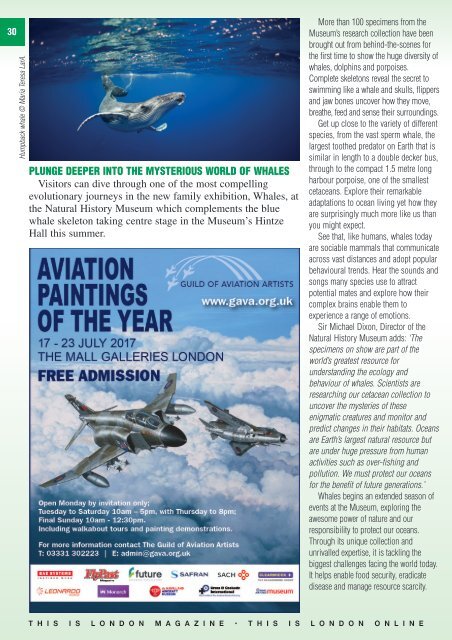TIL_Sommer_21-7-17
Create successful ePaper yourself
Turn your PDF publications into a flip-book with our unique Google optimized e-Paper software.
30<br />
Humpback whale © Maria Teresa LarA.<br />
PLUNGE DEEPER INTO THE MYSTERIOUS WORLD OF WHALES<br />
Visitors can dive through one of the most compelling<br />
evolutionary journeys in the new family exhibition, Whales, at<br />
the Natural History Museum which complements the blue<br />
whale skeleton taking centre stage in the Museum’s Hintze<br />
Hall this summer.<br />
More than 100 specimens from the<br />
Museum’s research collection have been<br />
brought out from behind-the-scenes for<br />
the first time to show the huge diversity of<br />
whales, dolphins and porpoises.<br />
Complete skeletons reveal the secret to<br />
swimming like a whale and skulls, flippers<br />
and jaw bones uncover how they move,<br />
breathe, feed and sense their surroundings.<br />
Get up close to the variety of different<br />
species, from the vast sperm whale, the<br />
largest toothed predator on Earth that is<br />
similar in length to a double decker bus,<br />
through to the compact 1.5 metre long<br />
harbour porpoise, one of the smallest<br />
cetaceans. Explore their remarkable<br />
adaptations to ocean living yet how they<br />
are surprisingly much more like us than<br />
you might expect.<br />
See that, like humans, whales today<br />
are sociable mammals that communicate<br />
across vast distances and adopt popular<br />
behavioural trends. Hear the sounds and<br />
songs many species use to attract<br />
potential mates and explore how their<br />
complex brains enable them to<br />
experience a range of emotions.<br />
Sir Michael Dixon, Director of the<br />
Natural History Museum adds: ‘The<br />
specimens on show are part of the<br />
world’s greatest resource for<br />
understanding the ecology and<br />
behaviour of whales. Scientists are<br />
researching our cetacean collection to<br />
uncover the mysteries of these<br />
enigmatic creatures and monitor and<br />
predict changes in their habitats. Oceans<br />
are Earth’s largest natural resource but<br />
are under huge pressure from human<br />
activities such as over-fishing and<br />
pollution. We must protect our oceans<br />
for the benefit of future generations.’<br />
Whales begins an extended season of<br />
events at the Museum, exploring the<br />
awesome power of nature and our<br />
responsibility to protect our oceans.<br />
Through its unique collection and<br />
unrivalled expertise, it is tackling the<br />
biggest challenges facing the world today.<br />
It helps enable food security, eradicate<br />
disease and manage resource scarcity.<br />
t h i s i s l o n d o n m a g a z i n e • t h i s i s l o n d o n o n l i n e

















